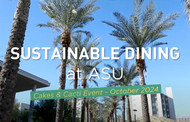ASU Works Toward Waste Diversion Goals
Posted by Eco-Products on Jan 9th 2025
Thanks to our friends Arizona State University, Aramark, and Sysco for helping us spread the word on how composting programs that include food waste and compostable products work!
Hint: It all starts by paying really close and consistent attention to product selection, and that will always be a team effort that includes manufacturers, distributors, and food service operators. Go team!
TRANSCRIPT:
We really look at how we can find new products that meet the standards of what is able to be composted at ASU, and so it's really important that we find partners who really know what they're doing and can work with the composter to see what is accepted and what is not. We're looking to divert as much waste as possible from the landfills, and by switching to compostable from single-use plastics we can work to meet those diversion goals.
It's really important to know that your compostable item is certified. This is important because there are certain items that may be deemed compostable, but if they're not actually certified they may not be able to truly be composted in the facility that's local to your area. So it really is of utmost importance to know what certifications that product has to ensure that you're not just sending an item that really should go to the landfill, because it's not going to break down properly.
We are actually featuring our certified compostable products many of which are used on campus today, and are all trying to support ASI's zero waste initiatives. Ideally our products end up in the compost bin.
They're all CMA certified (which is what our composter here in the city of Phoenix requires) then once all the organics and the compostable products are processed they get turned into a nutrient-rich soil amendment which we're actually giving away today. So we've got some compost from the city of Phoenix to give away to students to really try to connect them to the circular system of what goes in the compost bin and what comes out.
When we really team up and partner with say Eco-Products, or partner with the University, partner with our local businesses and local farms, we really can create this exciting change that wouldn't be able to happen if we were just doing it on our own. So I think it's really important that we work together as a team to make our world more sustainable.

